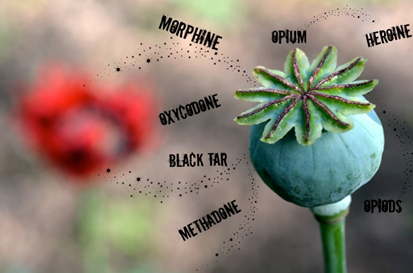Native to Asia, South America, and Mexico, the opium poppy is the source of heroin. Commonly called smack, brown sugar, junk, or horse, it appears as a brown or white powder or a black tar. Heroin is highly addictive; the dependence can occur after only one or two uses. Heroin is usually snorted or smoked, but some abusers inject it to have the quickest high. Direct injection makes overdose easier and can spread disease through needle-sharing. Even though the dangers are well-known, heroin use is on the rise. Read on to find out how heroin affects the body.

How Does Heroin Affect the Body in the Short Term?
Heroin enters the brain through blood stream. Then the brain converts heroin to morphine that attaches itself quickly to the opioid receptors. This induces the “rush”–a surge of pleasurable sensations that users seek. The degree of the rush depends on how much heroin is taken and how quickly it enters the brain. The rush is often accompanied by itching, a warm flush of the skin, dry mouth, and heaviness in the extremities. Nausea and vomiting may also be experienced. After the initial high, the users are usually drowsy for several hours, the brain function is clouded, the heart slows, and there is a marked slowing of the breathing. Slow breathing may lead to a coma or permanent brain damage.
How Does Heroin Affect the Body in the Long Term?
1. Brain Damage
Many scientific studies have shown significant brain damage as the result of heroin use. The brain can deteriorate, which results in spastic attacks, permanent hand tremor, and overall weakness. Opiate overdoses can cause short oxygen deprivation and cognitive decline. Even heroin use that doesn’t overdose can cause a blood oxygen drop for up to thirty minutes, sufficient to cause organ and brain damage after repetitive usage. Some heroin addicts also suffer from sleep apnea that contributes further to an insufficient amount of oxygen getting to the brain.
2. Hepatitis and HIV
Not everyone who uses heroin injects it, but those who do increase their risk of contracting Hepatitis B or Hepatitis C or HIV. Hepatitis B is transmitted via shared bodily fluids. It causes jaundice, inflammation of the liver, and vomiting. A chronic disease, Hepatitis C leads to liver cancer or liver cirrhosis. One of the major ways that users contract HIV, which leads to AIDS, is through shared or dirty needles.
3. Heart Disease
How does heroin affect the body? Heart disease is another dangerous complication. Heroin affects the heart or heart valve lining, which interferes with the heart function, leading to heart failure. Heroin addiction puts users at a higher risk for stroke or heart disease.
4. Kidney Disease
Kidney failure is another effect of long-term heroin abuse. Heroin use may cause kidney stress, which leads to a decrease in kidney function or even total shutdown. Some symptoms of kidney failure are lethargy, fatigue, and loss of appetite. The viral contaminants or bacteria in heroin or in the toxic substances used to dilute heroin are thought to cause the elevation of uric protein, which can lead to kidney failure.
5. Pneumonia and Tuberculosis
The use of heroin weakens the users' respiratory system, affecting lung function. Sustained use can affect the immune system. The combination of these two factors puts heroin users at an increased risk of tuberculosis and/or pneumonia. Tuberculosis is a bacterial infection in the lungs.
6. More Consequences of Using Heroin
Here are even more ways heroin will ruin the users' life. They include dry skin, itching, constipation, lack of appetite, reduced sex drive, low blood pressure, constricted pupils, and reduced night vision. The users will also have skin infections, fatigue, irregular heartbeat, labored breathing, irregular menstrual periods, and an increased risk of injury while driving or working. More side effects include inflamed gums and bad teeth, collapsed veins, cold sweats, depression, weakened immune system, insomnia, liver disease, loss of intellectual performance and memory, and worsening rheumatism and arthritis.
How to Treat Heroin Addiction
Besides the answer to "how does heroin affect the body?" here are also effective treatment methods.
Medical Treatment
There are various treatments for heroin addiction, but they begin with the detoxification process. It can be done either as an outpatient or inpatient treatment, and helps the addicts adjust to the lack of the drug. Certain prescription medications can be used to minimize the withdrawal symptoms. These include clonidine, hydroxyzine, and ondansetron. Other medications that are used for addiction therapy include Suboxone, Vivitrol, and methadone.
- Suboxone contains buprenorphine, a partial opioid agonist, and naloxone, an opioid antagonist. The buprenorphine satisfies the drug craving without the dangerous side effects or the high. It is usually taken sublingually (under the tongue).
- Vivitrol is also an opioid antagonist called naloxone. It is given as a monthly injection, and blocks the heroin high if the addicts use the drug.
- Methadone is another opioid agonist that is slow-acting and taken orally once every twenty-four hours. The individualized dose prevents withdrawal, but doesn’t produce the euphoria. Used since the 1960s to treat heroin addiction, it is still a very good treatment option, but is only available through an outpatient program.
Behavioral Counseling
Behavioral counseling teaches recovering addicts how to cope with stress in positive ways rather than resorting to drug use. It is an important facet of any residential or outpatient treatment. Because relapse is common, some addicts need long-term or life-long treatments to stay clean.
Click here to find the signs of heroin use.
